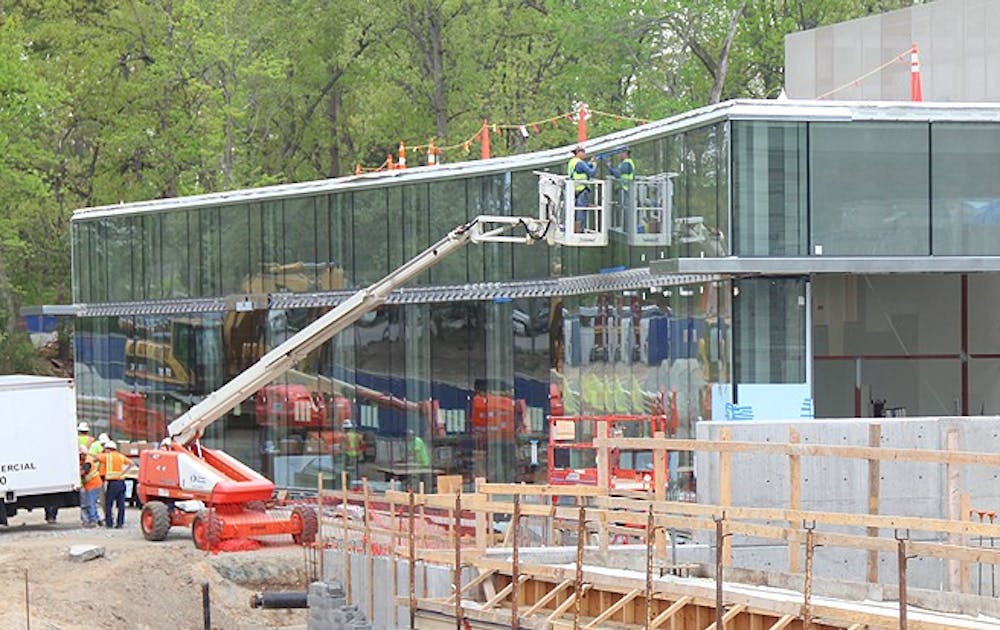Even after receiving the largest donation in Duke’s history, the University is struggling to carry out a major renovation project.
In March 2011, the Charlotte-based Duke Endowment announced the single biggest gift that the University had ever received—an $80 million contribution designed to be paid over several years, which would fund renovations for Baldwin Auditorium, West Union Building and Page Auditorium. But as the planning process advanced, technical and budgetary concerns have forced Duke to re-evaluate its project. Although the renovations to Baldwin are nearly complete, the Board of Trustees recently rejected the plan for the West Union remodel, prompting a redesign, said Executive Vice President Tallman Trask. Furthermore, it is unknown when the full $80 million will be delivered to Duke, and Page will be too expensive to fully renovate with the available funds.
“I never did think it would make the $80 million [budget],” Trask said. “We knew we were going to have to provide something else somewhere.”
But the Endowment—a private foundation, independent of the University—thought the donation would cover “at least almost all” of the costs of the renovations, said Susan McConnell, director of higher education for the Endowment.
Back to the drawing board
West Union renovations were scheduled to begin this summer and finish in the summer of 2015. Outlines of the renovations had been made public since 2011 and organizations based in West Union began to move their offices out of the building earlier this month. But when the Board of Trustees saw the final plan in early May, they did not approve it—leaving the specifics of West Union’s fate temporarily unresolved.
“We’re going back to redo it, starting [Thursday],” Trask said. “Right now, I don’t have a plan and I don’t have a price.”
The Board took issue with “a lot of little things,” Trask said, including financial aspects of the plan and features of the renovations themselves, but did not specify exactly what those issues were.
“I don’t think it’s appropriate to go into details,” Vice President for Student Affairs Larry Moneta said when asked about the Board’s decision.
A new plan should be completed within two or three months, Trask said, but the Trustees will not vote on the renovations until they reconvene in October.
Moneta noted that this does not necessarily mean that all construction is delayed until the Fall. The Executive Committee of the Board will meet over the summer and can approve certain parts of the renovations in order to allow work on the building to begin in some capacity. He added that the basic plan for the renovations is still intact and the project still has the opportunity to operate on schedule.
“I hope to get most of this resolved over the summer,” Moneta said.
Still waiting on the money
Duke initially requested $100 million for the renovations, Trask said. But discussions with the Endowment were taking place as the foundation was beginning to suffer from the economic downturn, and the University settled for $80 million instead.
Although the gift was always intended to be paid over several years, no fixed schedule of payments was ever established, Trask said.
To date, the University has received $17 million—an initial 2011 payment of $10 million and $7 million given later, McConnell noted. Another payment is expected before the end of the year, this one between $6 and $8 million.
“It’s kind of being played by ear,” McConnell said. “The market fluctuates, so our ability to make a payment varies year by year.”
She added that the Endowment anticipates that the money will be paid over eight to ten years.
Trask, however, spoke of a shorter timeframe—four or five years.
When this disparity in timelines was brought to his attention, he noted that the economic downturn had likely affected the payment schedule.
“We will get it when we get it,” he wrote in an email Wednesday. “Duke can handle the cash flow issues in the interim.”
He added that since the announcement of the $80 million gift, Duke has been working to procure additional funds for the renovations. The University has thus far been successful in securing nearly $20 million through various gifts, Trask said, though he could not specify donors or figures.
Page left unturned
The University began the remodel project in Fall 2011 with Baldwin renovations, which are scheduled to be complete for the 2013-14 school year. The renovations cost $15 million of the $17 million that the University has received from the Endowment, Trask said. Despite the progress with Baldwin, Duke cannot begin to plan for Page until a definite price is affixed to the West Union project, he added.
A number of possibilities have been discussed as potential renovations for Page, which was built in 1930.
“Part of the problem now is that it’s just ugly,” said Trask. “The other problem is that Page was designed before codes existed, but it was designed to violate every code known to anyone.”
Scott Lindroth, vice provost for the arts, noted several issues with the auditorium—poor stage visibility, an uncomfortable balcony, the steep pitch of the seats and the outdated sound and lighting.
“The principal problem is the audience experience,” Lindroth said.
Regardless of West Union’s price, the University will be unable to do a complete renovation of Page—Trask estimated that a total overhaul would cost $75 million.
“That was never really in the cards,” he said. “Now it’s just trying to figure out what version of the lesser improvements needs to happen.”
Trask added that the renovations would likely not be particularly extensive, but he said that some degree of repair would be done.
Despite the financial obstacles, it is imperative that steps be taken to improve Page, Lindroth said.
“It’s the largest venue on campus aside from the Chapel,” Lindroth said. “It’s an important venue for us, an opportunity for us to put our best foot forward.”
Get The Chronicle straight to your inbox
Signup for our weekly newsletter. Cancel at any time.

